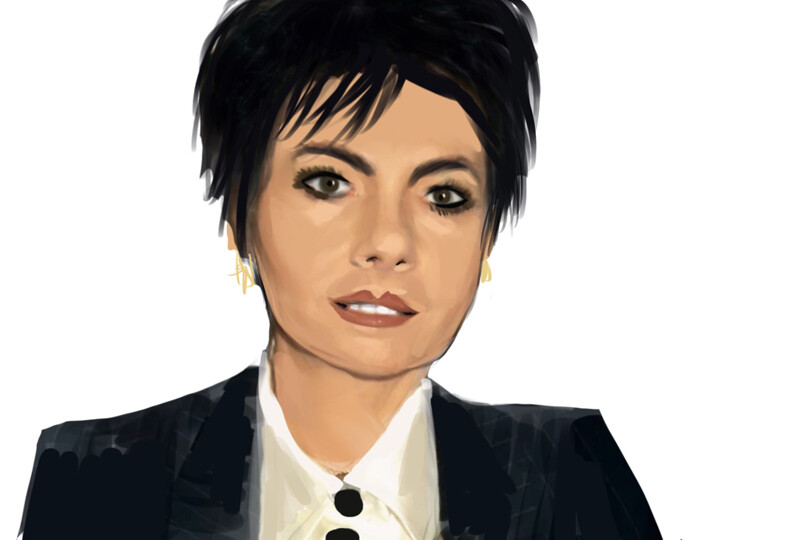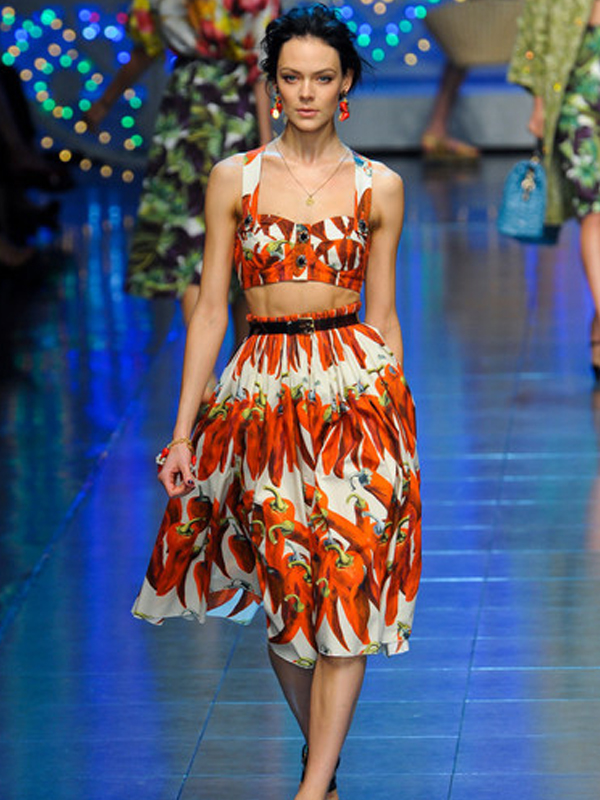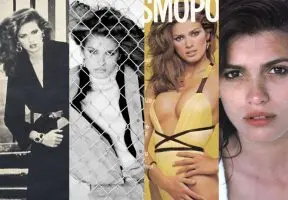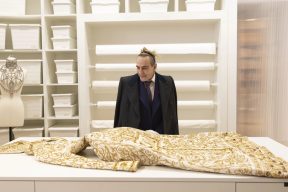Part of an ongoing series of 29Secrets stories, taking a deep dive into the history of legendary beauty products and iconic fashion and pop culture moments…
By Christopher Turner
Illustration by Michael Hak
When Patrizia Reggiani married Maurizio Gucci in 1973, they became one of Italy’s first celebrity power couples: fashionable, powerful and the envy of the glitterati. But a decade later, things began to dramatically unravel, when Maurizio inherited his father’s 50 per cent stake in Gucci and launched an ugly legal battle against his family for full control of the fashion empire. Of course, the drama didn’t end there for Maurizio, or for the woman who was once known as Italy’s “Lady Gucci.” Like any good Italian soap opera, this story is filled with plenty of power struggles, money, adultery and murder.
Today Patrizia is most famous for hiring a hit man to kill her ex-husband in 1995; he was the last member of the family dynasty to run the fashion label. The murder took place a year after the fashionable couple finally divorced, when Maurizio was shot and killed by a hit man on the steps outside his office as he arrived at work. Two years later, Patrizia was sentenced to 29 years in prison for plotting her former husband’s assassination.
Ridley Scott’s forthcoming biographical crime drama, House of Gucci (which arrives in theatres on November 24), takes a look at the events pre- and post-Maurizio’s murder. Based on Sara Gay Forden’s 2001 book The House of Gucci: A Sensational Story of Murder, Madness, Glamour, and Greed, the star-studded cast includes Lady Gaga, Adam Driver, Jared Leto, Jeremy Irons, Salma Hayek and Al Pacino. In anticipation of the film, here’s a look back at the real-life woman at the centre of it, the Italian socialite who is often referred to by both media and the public as the “Black Widow.”
Fashionable beginnings
Patrizia Reggiani Martinelli was born on December 2, 1948, in Vignola, a small town outside Milan to a waitress and a much older man who had made his fortune in trucking. As a young woman, she liked the finer things in life – so it was no surprise when she found her way into the upper echelons of Milan’s social circuit in the ’70s, where she eventually met Maurizio Gucci, one of the heirs to the illustrious Gucci fashion house. Maurizio was the son of Rodolfo Gucci and grandson of the company’s founder, Guccio Gucci.
Patrizia had other suitors, but her violet eyes and petite figure mesmerized the young Gucci when they met on the night of November 23, 1970. For him, it was love at first sight; for her, it was the beginning of her conquest of one of Milan’s most prominent young bachelors, and one of Italy’s most glamorous names. He was 22 years old, she was 21.
“I met Maurizio at a party and he fell madly in love with me. I was exciting and different,” Patrizia told The Guardianin an in-depth interview in 2016. “I didn’t think much of him at first. He was just the quiet boy whose teeth crossed over at the front.”
When the couple married on October 28, 1972, the wedding was one of the big social events of the year – but not one of Maurizio’s relatives was there. The union caused a rift between Maurizio and his father Rodolfo, who disapproved of Patrizia’s background and, no doubt, her strong personality. True, Maurizio was an only child, whose mother had died when he was five, and his father had always been overprotective, but Rodolfo believed that Patrizia was “a social climber who has nothing in mind but money.”
Despite the initial disapproval, Rodolfo eventually gifted his son and new daughter-in-law with a luxury penthouse in New York’s glamorous Olympic Tower. The couple relocated to midtown Manhattan and became active in New York social circles, making regular appearances at parties and fashion shows, and becoming friends with Jackie Onassis and the Kennedys. They lived extravagantly, their car’s personalized license plate read “Mauizia,” and the couple sailed to private islands on a 200-foot yacht, stayed in a ski chalet in St. Moritz, and owned a home in Acapulco as well as a farm in Connecticut.
Patrizia revelled in their luxe lifestyle. One of her more famous quotes: “I would rather weep in a Rolls-Royce than be happy on a bicycle.”
“We were a beautiful couple and we had a beautiful life, of course,” Patrizia told The Guardian. The couple went on to have two daughters: Alessandra, who was born in 1976, and Allegra, who was born in 1981.
But all good things must come to an end and in 1982, Maurizio, Patrizia and their two daughters left New York and headed back to Milan. Maurizio had an agenda.
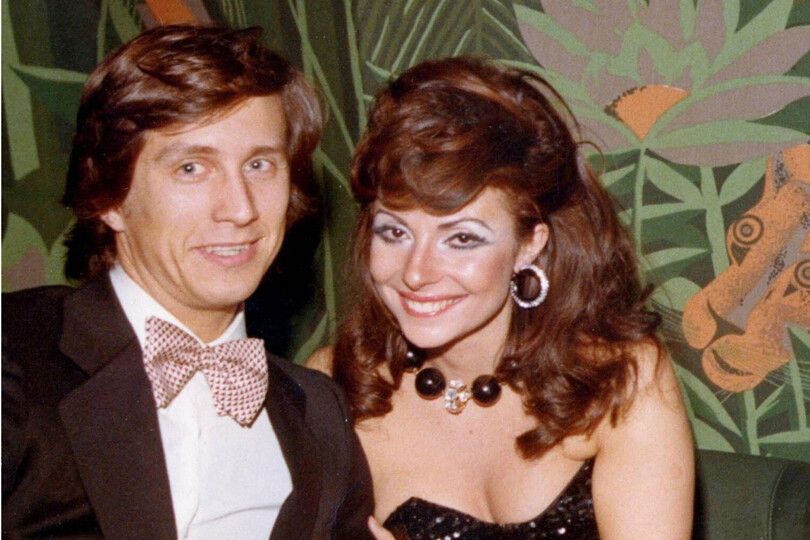
The beginning of the end?
Rodolfo Gucci died on May 15, 1983, and things began to unravel shortly after. Rodolfo was one of six children (five of whom were sons) of Guccio Gucci, the founder of the Gucci fashion house. After Guccio’s death in 1953, there was a lot of sibling rivalry to hold power within the company. By 1974, the business had been divided 50/50 between Rodolfo and his older brother, Aldo (1905-1990), with other siblings playing key roles within the company. As an only child, at Rodolfo’s death Maurizio inherited his father’s ownership of the business, and he launched an ugly legal battle against his uncle Aldo for full control of the company. (This was a prosecution led by then-city prosecutor Rudolph Giuliani, now better known as Trump’s controversial personal attorney.) Maurizio fought his uncle and cousins for years until he pulled off a plot to buy them out with the help of Bahrain-based investment fund Investcorp.
Patrizia had played a key role in the company for years, but after Maurizio took control, she was edged out and their marriage began to unravel. As CEO, he dismissed other relatives from the company and tried to rebuild Gucci’s diminishing status. “Maurizio got crazy,” Patrizia told The Guardian. “Until then I was his chief adviser about all Gucci matters. But he wanted to be the best, and he stopped listening to me.”
The Gucci brand had been losing prestige from over-licensing its famed double-G logo and from mass production of canvas bags. Maurizio had a plan to restore it to high-end glory by reverting to the exquisite craftsmanship the company had been built upon. But because of a string of Maurizio’s bad business decisions, the company continued to lose millions over the next several years.
Meanwhile, life at home was deteriorating for Maurizio and Patrizia. In a shocking and seemingly sudden move, Maurizio packed a bag one night in 1985, telling his wife he was going on a short business trip to Florence – and never returned home. The following day, he sent a friend to tell Patrizia that he would not be returning and that their marriage was over. After 12 years of marriage, Maurizio walked out on his family, including daughters Allegra and Alessandra.
As part of the divorce settlement, Maurizio agreed to pay Patrizia an annual alimony of $1.47 million. But, by law, she was no longer allowed to use the Gucci surname.
At some point, Maurizio had reconnected with an old friend from the European party circuit, Paola Franchi, who was now an interior designer. Both of them were in troubled marriages. “We fell in love immediately,” Paola told The Guardian. “Maurizio used to tell me that we were two halves of the same apple.”
After leaving Patrizia, Maurizio lived with Paola and her son for five years. Paola told The Guardian that Patrizia stalked Maurizio and often called threatening to kill him. Paola said she pleaded with Maurizio to hire a bodyguard, but he refused. “He didn’t believe Patrizia would go through with her threat because of their girls.” Paola was portrayed in the media as a gold digger, but she casts those claims aside, saying: “Actually my previous husband, whom I left for Maurizio, was even richer, so it was all nonsense.”
During his relationship with Paola, Maurizio spent enormous sums of money – both his own and the company’s – with such reckless abandon that after repeated losses he was forced to sell all of his Gucci shares to Investcorp, the company he had used to force out his family years earlier. The Bahrain-based investment group gained control of the House of Gucci in 1993 after paying Maurizio $170 million. As of Monday, September 26, 1993, Investcorp controlled 100 per cent of Gucci.
“I was angry with Maurizio about many, many things at that time,” Patrizia told The Guardian. “But above all, this. Losing the family business. It was stupid. It was a failure. I was filled with rage, but there was nothing I could do. He shouldn’t have done that to me.”
The shooting
On March 27, 1995, at around 8:30 am, Giuseppe Onorato (at the time, the doorman for the building at Via Palestro 20, where Maurizio’s private office was located) was sweeping leaves when the heir appeared, walking up the steps wearing a gray wool Prince of Wales suit, a crisp blue shirt and a blue silk Gucci tie.
“Mr. Gucci arrived carrying some magazines and said good morning,” he remembered for The Guardian. “Then I saw a hand. It was a beautiful, clean hand, and it was pointing a gun.”
Four shots were fired: three at Maurizio’s back and a fourth at his head. Then, when the shooter saw Onorato, the only eyewitness, he shot twice more, hitting him in the arm. Still, somehow Onorato made it over to Maurizio. “I was cradling Mr. Gucci’s head,” he continued. “He died in my arms.”
Patrizia was an immediate suspect, considering she had very publicly threatened to kill her ex on numerous occasions after their acrimonious split. But without evidence, the case went cold for two years.
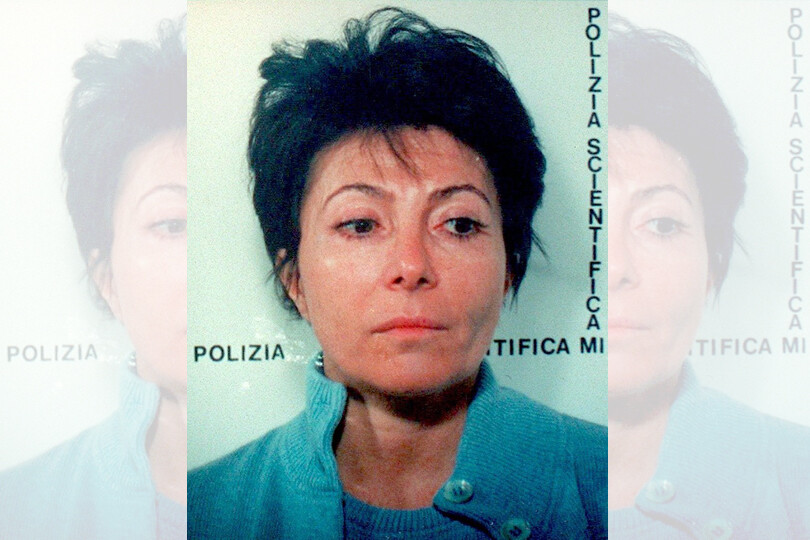
A media circus
It wasn’t until nearly two years later, in 1997, that things began to unravel, after one of Patrizia’s accomplices boasted about the murder to the wrong person. An anonymous tip pointed to Ivano Savioni, a hotel porter who had been contacted by Patrizia’s personal psychic, Giuseppina Auriemma, to help her hire hitman Benedetto Ceraulo and getaway car driver Orazio Cicala.
The trial began to unfold on the morning of June 2, 1998. It was like a real-life soap opera, captivating Italy with scandalous tales of infidelity, designer clothes, extraordinary wealth, vengeance and a certified psychic-turned-accomplice. Patrizia was under constant scrutiny by an arguably misogynistic press that dubbed her “Vedova Nera” (which translates to the Black Widow), and painted her as a greedy, scorned woman who was out for revenge.
Of course, there was plenty of damning evidence against Patrizia. Over the years, she had told numerous friends and reporters that she wished Maurizio were dead. Then there was one striking piece of evidence that was discovered when police searched Patrizia’s home: her Cartier diary, which had a one-word entry written in all capital letters on the day of Maurizio’s murder – “PARADEISOS,” the Greek word for paradise. Despite the evidence, Patrizia maintained her innocence, with her lawyers telling the court that the “threats were the ramblings of a mentally disturbed woman,” The New York Times reported. But a psychiatric panel came to the conclusion that Patrizia was “mentally competent” at the time of the trial.
During the trial, Patrizia claimed that her psychic Giuseppina was actually behind everything and had tried to blackmail her. “Never let even a friendly fox into the chicken coop,” Patrizia told the jurors when she spoke of her former best friend. “Sooner or later it could get hungry.” Of course, she contradicted herself during the cross-examination and said she had been forced to pay Giuseppina $365,000, before making the puzzling statement, “It was worth every penny.”
On the day of the trial’s verdict – despite the company’s supposed indifference to the scandal – Gucci stores reportedly hung silver handcuffs in shop windows. According to Forden’s book The House of Gucci, it was shortly after 5 pm on November 3, after nearly seven hours of deliberations, that Patrizia Martinelli Reggiani and all four accomplices were found guilty of the murder of Maurizio Gucci. Sentences, which in Italian courts are issued at the moment of the verdict, were as follows: Patrizia Reggiani, 29 years; Orazio Cicala (the getaway car driver), 29 years; Ivano Savioni (the hotel porter), 26 years; Giuseppina Auriemma (the psychic), 25 years. Only the gunman, Benedetto Ceraulo, was given a life sentence.
The journalists and cameras that crowded the courtroom pressed against Patrizia, who huddled between her lawyers.
“Truth is the daughter of time,” she said before she closed her mouth firmly, refusing to say more.
The couple’s daughters (Alessandra, then aged 21, and Allegra, then aged 17) argued that Patrizia’s conviction should be overturned, claiming that a benign brain tumour had altered their mother’s behaviour and personality. It’s true that Patrizia was diagnosed with a brain tumour in 1992, but it was removed without any negative consequences. The request was denied.
After the conviction, Alessandra and Allegra, who are now in their 40s and have always stuck by their mother (at least publicly), directly inherited Maurizio Gucci’s millions, as well as the yacht and properties in New York, Saint Moritz and Milan. Patrizia declared herself nullatenente – the Italian word for bankrupt, meaning “a person who has nothing.”
After prison
In October 2011, Patrizia became eligible for parole under a work-release program, but she refused, saying, “I’ve never worked in my life and I’m certainly not going to start now.” But within a couple of years she would change her mind.
Her original 29-year sentence was reduced to 26 years, and in 2014, after serving 16 years in prison – which she referred to as “my stay at Vittore Residence” – Patrizia began a work release program. After her release, Patrizia was hired as a design consultant by Milan-based brand Bozart, a costume jewellery company that was famous in the 1980s for outfitting Madonna and Pamela Anderson, and even Linda Evans’ character Krystle Carrington on the hit late-night soap Dynasty.
Around the same time that she started at Bozart, she was badgered by a TV crew of an Italian reality show who asked her: “Patrizia, why did you hire a hitman to kill Maurizio Gucci? Why didn’t you shoot him yourself?”
“My eyesight is not so good,” she deadpanned. “I didn’t want to miss.”
That same year, she also told the Italian daily newspaper La Repubblica that, now she was available again, she hoped to return to the company fold. “They need me,” she said. “I still feel like a Gucci – in fact, the most Gucci of them all.”
![]()
Want more? You can read other stories from our The Story Of series right here.

